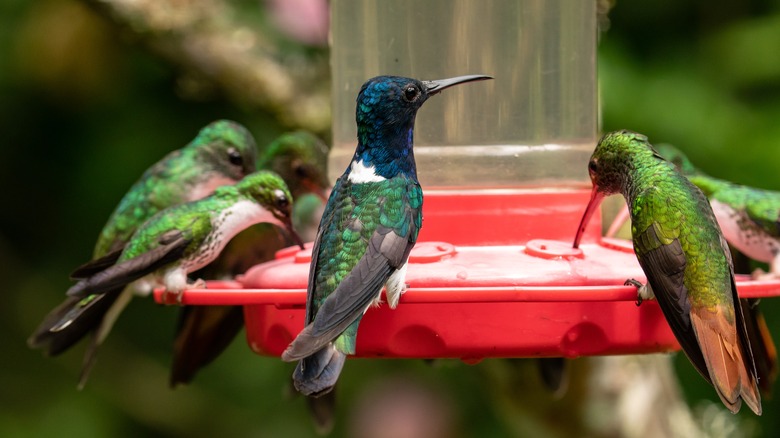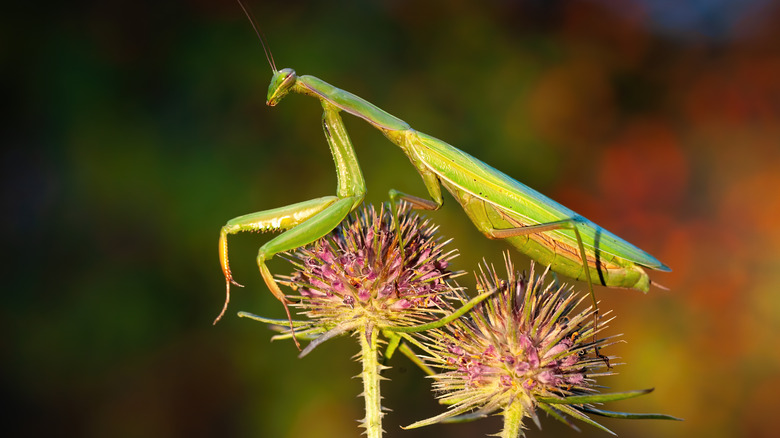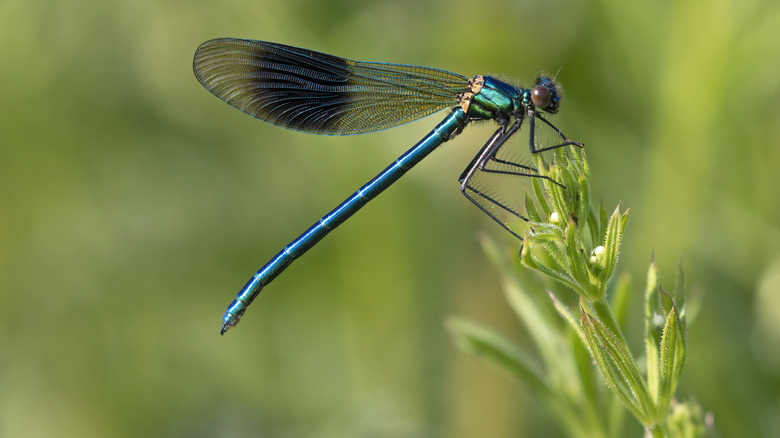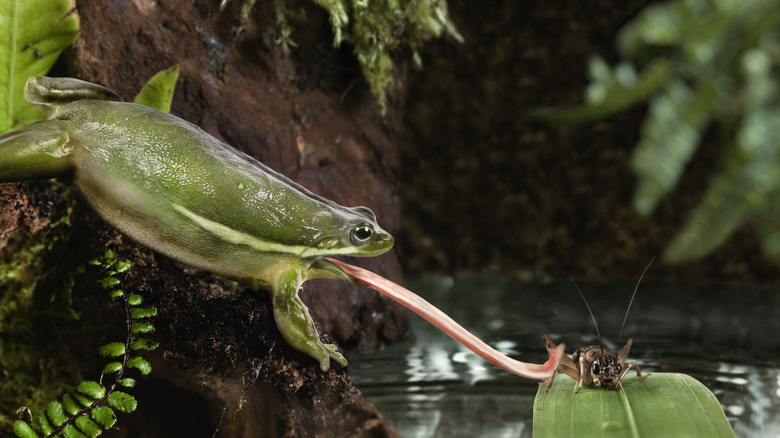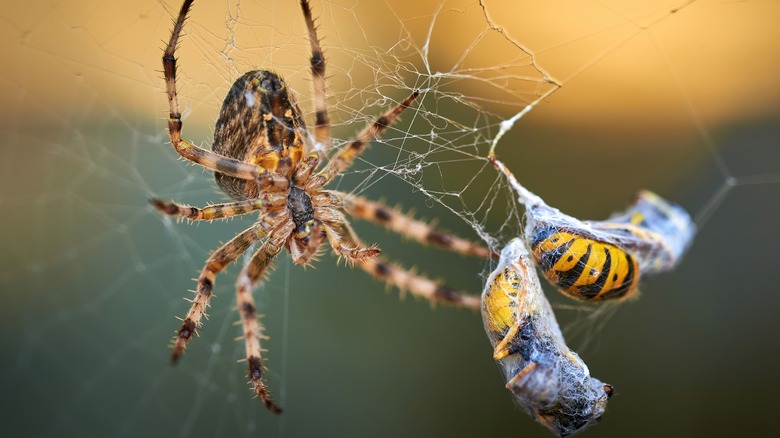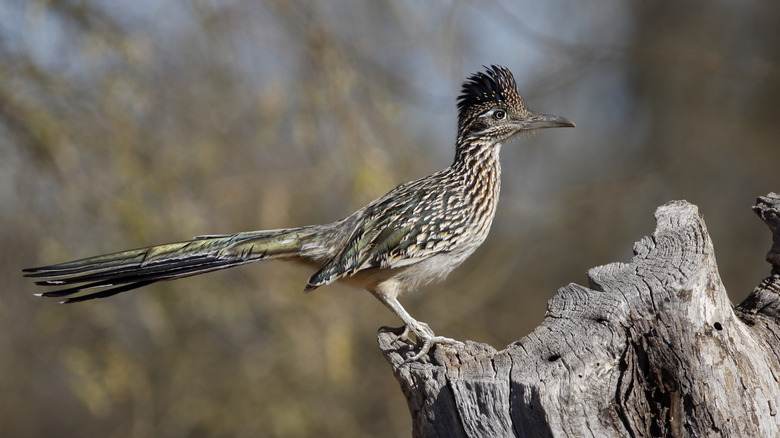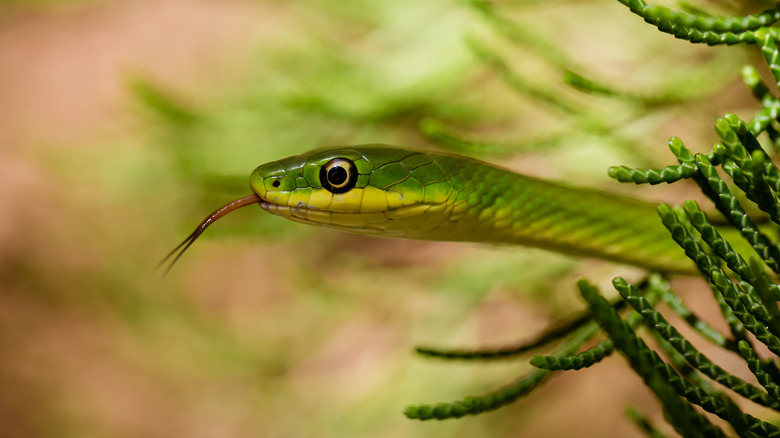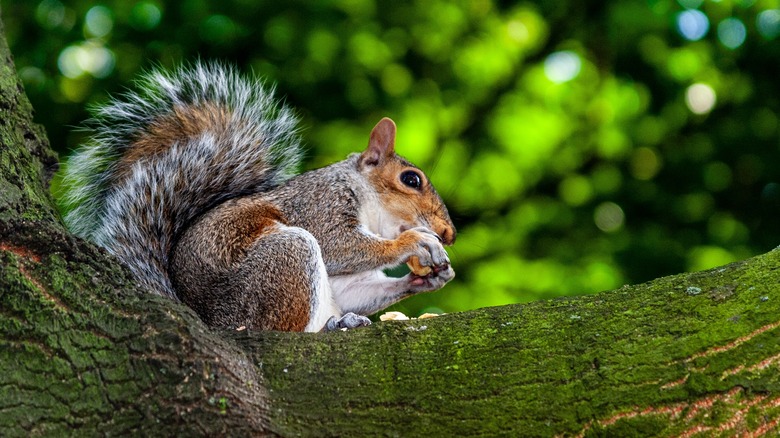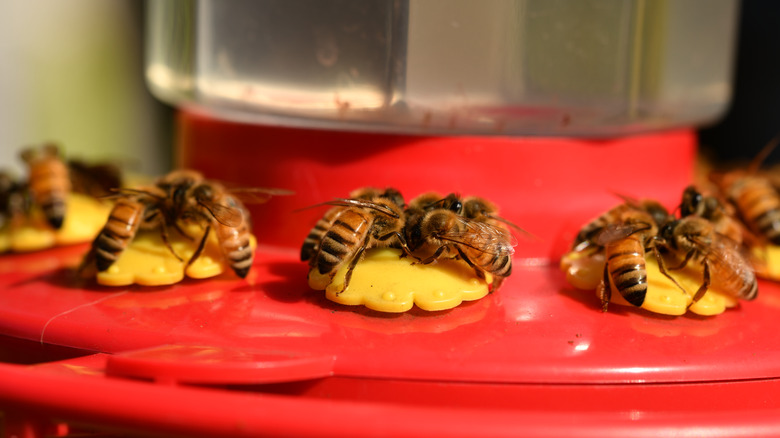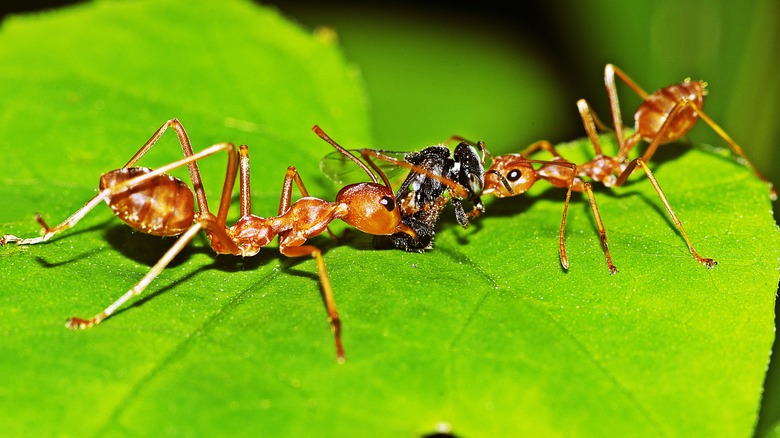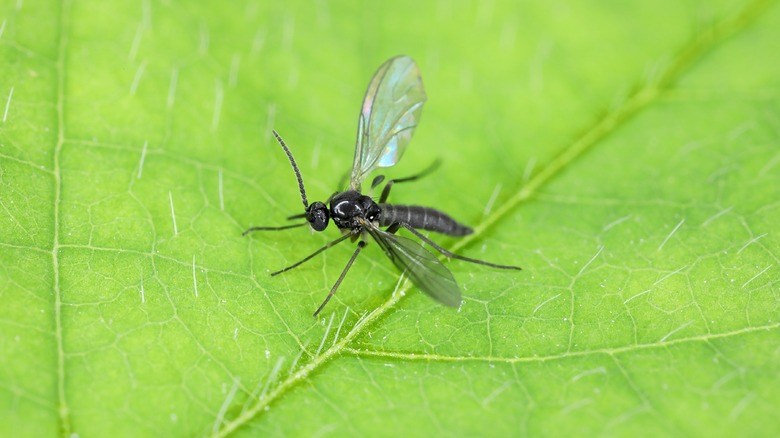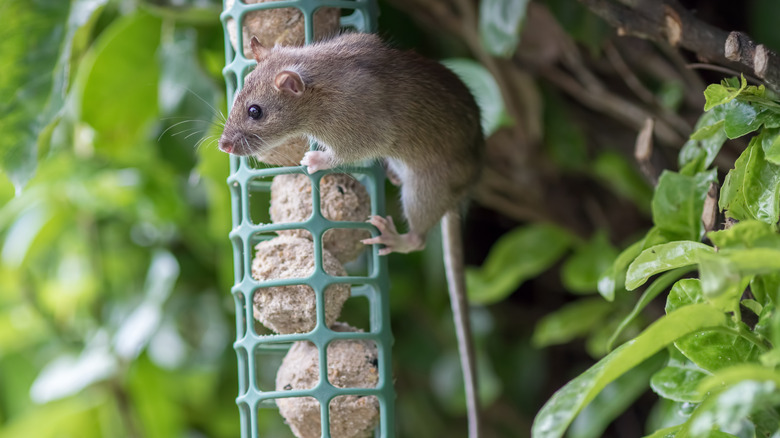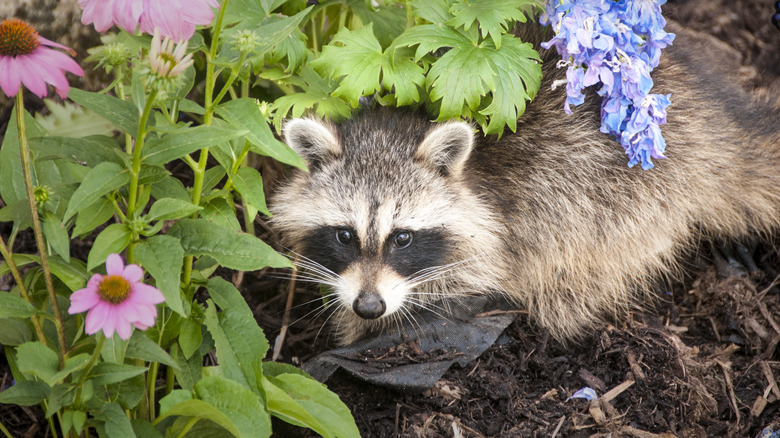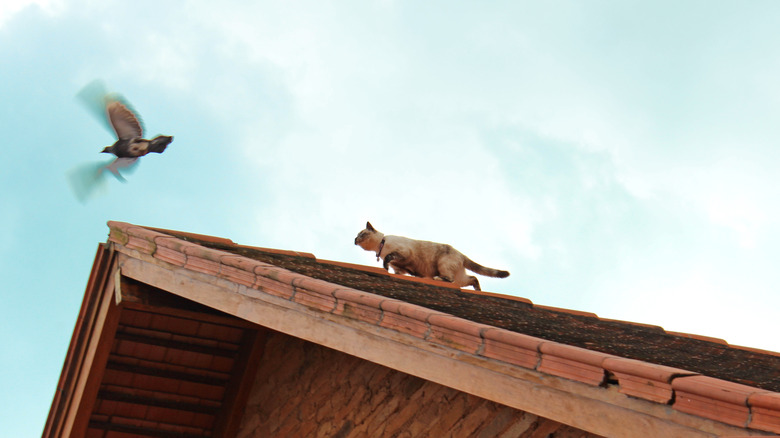Hummingbird Predators And Pests You Don't Want Anywhere Near Your Feeders
It can be hard to foster a good balance in the ecosystem of your garden. You plant the right plants that work well together in harmony with the soil, repelling pests and attracting pollinators to your garden while also attracting good predators that keep your plants safe from pests that bug them and want to munch on their leaves. It can be frustrating when that perfectly timed dance in your garden is thrown off by a greedy and unwelcome gatecrasher who preys on your pollinators. Bees, butterflies, and hummingbirds are just some of the fan favorites in the garden that come to pollinate and breathe life into its vibrant ecosystem.
Hummingbirds are particularly vulnerable to pests that lie in wait to rob them of their sweet nectar or trap them to devour them entirely. These include the prayin mantis, frogs, snakes, chipmunks, and bees, among others. All hope is not lost though. There are a few tips and tricks you can deploy to outsmart these pests and keep your adorable hummingbirds safe from harm in your garden.
1. Praying Mantis
More like preying mantis! These insects are usually welcome in your garden when they tend to the business of preying on pests like aphids, leafhoppers, and mosquitoes. They lose the plot when they start preying on pollinators. A praying mantis is known to lie in wait near feeders and pounce on hummingbirds to suck the sweet nectar from the bird. If you see a praying mantis near your feeders, you can remove the mantis and release it elsewhere, but it would be safer to reposition the feeder elsewhere, far from trees where predators can attack.
2. Dragonflies
Insects that prey on others usually attack insects that are smaller than they are but they have been known to target larger prey if they have gone a long time without food. Dragonflies can be similar in size to hummingbirds, which can make for a surprisingly fair fight, depending on the situation. Placing the feeder away from trees might reduce the risk of dragonflies stalking hummingbirds near feeders but they can still wait for them near other plants that attract dragonflies, so be careful when placing your feeder.
3. Frogs
If you have a water feature in your yard or just experienced heavy rain, expect frogs. These croakers are known to sit incredibly still as they wait for their prey before snatching them up in the blink of an eye. Hummingbirds are no exception to this rule. Frogs jump out of ponds to pounce on hummingbirds and devour them whole. Repelling frogs from your garden isn't a good idea but you can protect your hummingbirds by opting for a feeder placed far from overhanging branches or gutter to keep frogs from getting to them.
4. Spiders
Hummingbirds use spider webs strands when nesting. They use them to attach their nest to branches and leaves as they continue to build. This strange choice of material can sometimes land them in big trouble when their feathers get trapped in the spider webs, where they'll eventually be preyed on. Though spiders aren't particularly to blame for this one, you can do some minor maintenance in your garden to ensure that spiders aren't weaving their webs between vegetation or near feeders where pollinators and beneficial insects can be trapped.
5. Birds
Birds of prey aren't limited to just eagles and hawks. Hummingbirds and their young are targeted by other birds like great roadrunners, merlins, and Mississippi kites. They are known to capture hummingbirds and knock them out against a hard surface like a rock or the ground before devouring them. There are certain birds you want to attract to your garden that will keep other predators and pests in check. A red-tailed hawk doesn't usually go for hummingbirds but it might deter other predators from circling around your hummingbirds' nest.
6. Snakes
Slimy intruders like snakes like to prey on hummingbirds' eggs and their young. While snakes may be a good way to keep rats out of your garden, they shouldn't be the first choice on your list of solutions. You can protect your hummingbirds by placing feeders far away from trees and shrubs where snakes might be able to make their way up to where hummingbirds gather. You can also provide safer nesting grounds for hummingbirds like thornier shrubs and cacti or trees with rougher barks to deter slithering predators.
7. Squirrels and chipmunks
Those furry little animals you see dashing around in your yard can be terrible pests to have in your garden because they turn your greenery inside out as they eat everything in their path. Their greed doesn't end there, as they're known to prey on young hummingbirds. While owls prey on these pests, they're also known to prey on hummingbirds so it's best to rely on other methods to get rid of squirrels like protecting your feeders or using scents that repel squirrels on the plants in your garden.
8. Bees and wasps
While bees and wasps normally keep to themselves and tend to their business, they can act as a deterrent for hummingbirds if they happen to bump into each other at a feeder brimming with sugar water. Bees don't usually attack hummingbirds but the small birds don't survive the stings when they do happen. They quickly succumb to the venom, as their little bodies can't tolerate it. You can protect your hummingbirds from bees and wasps near feeders by attaching nectar guards onto your feeders that only hummingbirds can reach with their long tongues.
9. Ants
Much like with picnics, it isn't a good time until ants show up and ruin it for everyone. Hummingbirds don't shy away from the protein they get from beetles, mosquitoes, and flies but ants aren't on the menu for them. Ants are just as drawn to the sweetness of the sugar water in feeders as hummingbirds and bees are. Ants aren't welcome in hummingbird feeders because they can easily get trapped and contaminate the nectar. Protect your hummingbirds by opting for a feeder that comes with a built-in ant moat to keep ants away from your feeder.
10. Gnats
Gnats are uninvited guests who likes to gatecrash. Finding gnats in your feeders is a sign that there may be bacteria and fungi growing in there. Hummingbirds can only eat so much of the sugar you put into the feeder in a day, the rest sits there and starts developing bacteria. Hummingbirds aren't bothered by the gnats, but bacteria and fungi in the feeder could be harmful to them. You can get rid of gnats by reducing the sugar you add to the water and cleaning the feeder regularly to ensure no bacteria is gathering.
11. Rats
Just like squirrels, rats are greedy and destructive rodents that make a nuisance as they eat everything they can get their tiny paws on. Rats are known to go after bird feeders with seeds in them, but they enjoy sugar water feeders, too. They can easily find their way up a staked feeder or crawl along lines and hangers around the feeder. You can invest in rat traps to keep rats out of your home and garden because once they find food, they're likely to return and may invade your home as well.
12. Raccoons, opossums and skunks
Raccoons, opossums, and skunks like to gather around bird feeders to catch any scraps or extra seeds that might fall. These animals are likely to return if they find food in your yard, and they may destroy your hummingbird feeder. You can banish raccoons from your yard by using "no mess" bird seeds without shells to avoid scraps that feed and attract these pests, though you may need to trap and release them if they persist. With water feeders, hanging them high off the ground should be enough to keep them away.
13. Cats
Cats are known to enjoy pouncing on small birds like hummingbirds for their next feed. The International Hummingbird Society recommends keeping domesticated cats indoors where they can be kept from preying on hummingbirds or other unsuspecting birds. You can keep hummingbirds safe from stalking cats by hanging bird feeders at least 5 feet above the ground away from fences and shrubbery where cats can hide. You can keep cats out of your garden with thorny succulents or fragrant plants like lavender and rosemary, which have a scent that repels them.
